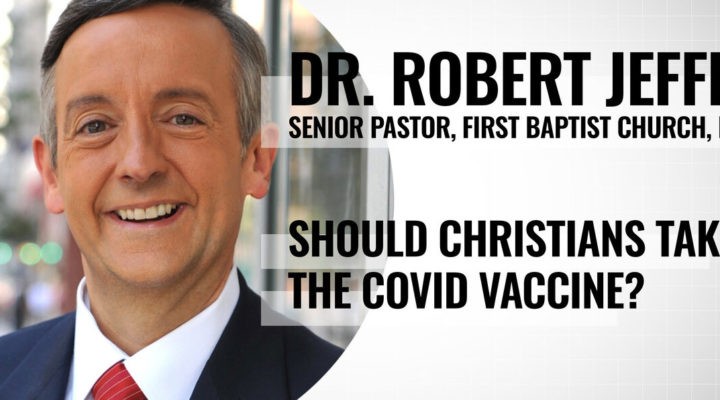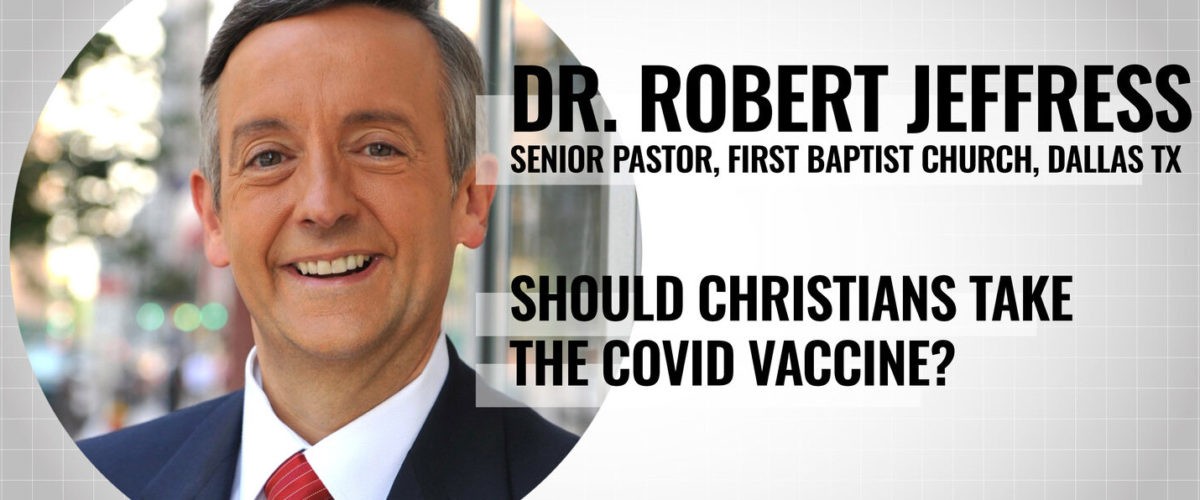Robert Jeffress and Pope Francis agree on at least one thing: There is no moral reason for Christians to resist getting a COVID-19 vaccine. And further, neither the Baptist pastor nor the Catholic pontiff will give you a religious exemption to avoid getting the shot.
“There is no credible religious argument against the vaccines,” Jeffress told the Associated Press over the weekend. “Christians who are troubled by the use of a fetal cell line for the testing of the vaccines would also have to abstain from the use of Tylenol, Pepto Bismol, Ibuprofen, and other products that used the same cell line if they are sincere in their objection.”
Concern about possible research ties to cell lines derived from aborted fetuses is one of the varied reasons anti-vaxxers — often conservative Christians — give for their refusals to be vaccinated. But even the pope — presumably the highest-profile opponent of abortion in the world — says it is “morally acceptable” to take the vaccines, which may be used “in good conscience.”
“There is no credible religious argument against the vaccines.”
Jeffress’ comments to the AP, as reported by the Dallas Morning News, echo comments he made in January to PBS when he called the vaccines a “present from God.” He explained: “To ask God for help but then refuse the vaccine makes no more sense than calling 911 when your house is on fire, but refusing to allow the firemen in. There is no legitimate faith-based reason for refusing to take the vaccine.”
Multiple scientists and faith leaders of prominent stature have explained that the COVID vaccines currently in use in the United States are not derived from aborted fetal cells and that the mRNA vaccines produced by Pfizer and Moderna should be clear-conscience choices for anyone concerned about entanglement with fetal cells.
Or as Baylor University professor Emily Smith — known online as “Your Friendly Neighbor Epidemiologist” — has plainly written, there are no “baby parts” in these vaccines and “you will not be injected with any fetal cell parts.”
Many mass-produced drugs in America are tested after development in petri dishes using the distant successors to a line of cells first obtained in the 1960s and 1970s from elective abortions. The Catholic Church has declared this historical connection to be so remote as to be negligible today.
And as Jeffress indicated, avoiding drugs that have been tested (not developed) using these successor cells would create a long list of pharmaceuticals to avoid, including acetaminophen, albuterol, aspirin, ibuprofen, Tylenol, Pepto Bismol, Tums, Lipitor, Senokot, Motrin, Maalox, Ex-Lax, Benadryl, Sudafed, Preparation H, Claritin, Prilosec, and Zoloft.
An Arkansas health system has taken this connection to heart and is requiring employees who request religious exemptions to the system’s COVID vaccine mandate to sign an affidavit that they also object to and will not use this long list of similarly tested products.
As of Friday, Sept. 17, the U.S. Centers for Disease Control reported that 74% of Americans ages 12 and older (those currently eligible for vaccination) have received at least one shot of vaccine and that 64% are fully vaccinated.
Many other pastors of evangelical churches remain afraid to speak too positively about vaccination because the issue has become so politicized that they fear being harassed by the anti-vaxxers in their own congregations.
Previous research on vaccine deniers or those who are hesitant to be vaccinated has identified a strong correlation between such attitudes and ethnicity (most likely white), politics (more likely Trump-supporting Republicans) and religion (more likely to be conservative evangelicals).
That’s why the pro-vaccine message from someone like Jeffress made headlines. He has been an outspoken ally of Trump, is a white male and leads an evangelical Christian church. Many other pastors of evangelical churches remain afraid to speak too positively about vaccination — even if they privately support it — because the issue has become so politicized that they fear being harassed by the anti-vaxxers in their own congregations.
American Baptist pastor and social researcher Ryan Burge told USA Today in late August that this is yet another sign of a growing gap between pastors and their evangelical congregations: “Over the last five years or so, the congregations have swung to the right of their pastors, and you can see those politics emerge in vaccine refusal. There’s a disconnect between pastors and congregations, and many pastors are wondering what to do.”
USA Today cited a January survey from the National Association of Evangelicals that found vaccine refusal more prevalent from the pews than the pulpit, with 95% of evangelical leaders saying they would be open to getting vaccinated.
Meanwhile, Christianity Today reports that a coalition of evangelical Christian colleges is working to get students on their campuses fully vaccinated. The Council for Christian Colleges and Universities joined an interfaith effort called Faith in the Vaccine, led by Interfaith Youth Corps, which has disbursed $4 million to the campaign. Nearly 50 schools are on board with the unified message promoting vaccination.
Related articles:
Looking for a religious exemption to a COVID vaccine mandate? Most denominations won’t help you
Church ‘religious exemption’ letters against COVID vaccination mandates likely won’t work | Analysis by Mark Wingfield
Francis Collins: ‘Give God the glory’ for vaccines ‘but roll up your sleeve’


